News
You'll Soon be Able to Set WhatsApp as Your Default Phone & Messaging App on iPhone
In iOS 18.2, Apple added an option to designate a third-party app as the default for calling and/or messaging. Now, third-party apps are starting to support the feature, starting with WhatsApp. The latest beta version of WhatsApp can be set as your default messaging app, default voice calling app, or both. Presumably, the feature will come to the non-beta version of WhatsApp soon. Apple initially developed the feature to appease EU regulators and was expected to limit it to that region, but later rolled out the feature worldwide. It is now part of a whole section in Settings for "Default Apps" that also includes email, Call Filtering, web browser, and Passwords & Codes.

The Minimalist Light Phone III Adds a Camera
The Light Phone III is now available for pre-order. This minimalist phone supports basic phone and text messaging features, but does not support apps, social media, or email. A curated set of essential features is designed with privacy in mind. These includes Directions, for step-by-step navigation via car or public transit, powered by Here. It also includes Directory, for finding basic info about businesses, powered by Google Places. It can also do voice-to-text transcription, powered by Rev.ai. It also supports music, podcasts, a calendar, audio and text notes, a timer, and alarms. Compared to the Light Phone II, the new model adds a simple 50 megapixel camera with dedicated two-stage shutter button, matte OLED display (instead of e-ink), metal frame, USB-C, fingerprint security, flashlight, and 5G. The Directions feature has been revamped to continuously update in real time, taking advantage of the OLED display. 5G is useful for the mobile hotspot feature as well as general future-proofing. It is sold unlocked and supports all three top US networks, (4G and 5G, in almost all frequency bands). The battery is also user-replaceable. Although not enabled at launch, it also has a front-facing camera and NFC hardware, so that a future software update can bring video calling and tap payments. The Light Phone III also sports a clickable, physical scroll wheel on the side. The phone is powered by a Snapdragon 4 Gen 2 processor and comes with 6 GB RAm and 128 GB storage. It's rated IP54 for dust and water. Its full price is $799, although it's currently available for $599 for a limited time. Pre-orders placed today should ship in July. (Earlier pre-orders will ship sooner.)
Utah Age-Verification Bill Signed Into Law
Utah Governor Spencer Cox has officially signed a law requiring app stores to verify user's ages and obtain parental consent for users under 18. Apple and Google oppose the law and may still challenge it in court.
FCC Proposes Stricter Rules for Vertical Location of 911 Callers
The FCC is drafting new rules that would require cellular service providers to report the vertical location of cell phones calling (or texting) 911 in a more useful measurement of Height Above Ground Level. They are also working to strengthen the testing and certification requirements of this technology in various environments (urban vs. rural).
Spectrum and Xfinity Launch Satellite SOS and Messaging
Spectrum Mobile and Xfinity Mobile have both launched emergency messaging via satellite for the Samsung Galaxy S25 series and Google Pixel 9 series Android phones. In the coming weeks, they will also launch non-emergency text messaging via satellite. The service offers basic connectivity in cellular dead zones, and uses the NTN satellite feature of those specific phones. Both Spectrum and Xfinity use Verizon's network, and Verizon enabled non-emergency satellite messaging just yesterday. All three companies rely on Skylo to provide this satellite service. NTN is an industry standard and specific technology found only in some phones, that lets a phone communicate directly with existing satellite networks, much like Apple's proprietary satellite features on iPhone. Other satellite services for phones (Starlink and AST SpaceMobile) offer greater phone compatibility, but require new satellites to be launched.
Verizon Launches Non-Emergency Satellite Messaging
As announced and promised last August, Verizon is now launching non-emergency text messaging via satellite in cellular dead zones for compatible Android phones. Currently, phones compatible with this NTN technology include the Google Pixel 9 series and the Samsung Galaxy S25 series. Verizon already offers emergency SOS and location sharing via satellite for these phones. Verizon is also working with AST SpaceMobile to offer expanded satellite service within two years, including more types of services and greater phone compatibility.

Google Intros Pixel 9a
Google has announced its newest mid-range Pixel phone, the Pixel 9a. At $499, it's significantly more affordable than $799 Pixel 9. Upgrades over last year's Pixel 8a include a display that's 35% brighter, an IP68 water-resistance rating (improved from IP67), macro camera mode, and a the same new Google Tensor G4 chip as the Pixel 9, bringing with it a full suite of Gemini Nano and Gemini Live AI features. It also comes with hallmark Pixel features like Car Crash Detection, a free VPN service, and seven years of software updates. Google also offers Family Link for parental controls and now Google Wallet For Kids with parental controls. The Pixel 9a has a 6.3-inch display with 120 Hz refresh, 48 megapixel main camera, 13 megapixel wide-angle camera, and 128 GB storage. A version with 256 GB storage is also available for $100 more. It will be available in April in Obsidian (black) or Iris (purple). Google, Verizon, and AT&T will sell it. Google is also the selling exclusive colors Porcelain (white) and Peony (pink), but only with 128 GB storage.
T-Mobile Reaches New 5G Speed Record
T-Mobile has achieved a record-breaking downlink (download) data speed of 4.3 Gbps on its 5G network using a Samsung Galaxy S25 in real-world conditions. The test leverages T-Mobile's 5G SA (stand-alone) network and six-carrier aggregation (6CA). 6CA is a relatively new feature of 5G. It was a little over a year ago that T-Mobile announced the world's first 6CA connection, reaching 3.6 Gbps at the time. While the commercially-available Galaxy S25 uses a Qualcomm Snapdragon X80 modem, T-Mobile also performed tests using Qualcomm's forthcoming X85 modem on a test device, and achieved even faster speeds of 6.3 Gbps on the downlink. Qualcomm expects phones using the X85 to reach the market "in the second half of this year."
T-Mobile Raising Rates on Old Plans Again
T-Mobile is raising rates on some of its older service plans by $5/line. The company did something similar with a different set of old plans last year. All affected customers should have received notice last Thursday. The company refused to explain exactly which customers were affected, saying "Not every customer on every plan is impacted, in fact, the majority of our customers are not included." The change goes into effect April 2nd. Verizon and AT&T have also raised rates on old plans in recent years, in one way or another.
Google Assistant Going 100% AI with Gemini
Google announced plans to infuse its Gemini generative AI into Google Assistant almost everywhere Assistant is available, including older mobile devices. Effectively, Gemini will replace Assistant. The change also applies to other types of devices, including tablets, home speakers, watches, and cars.
Apple Pledges to Support Encryption in New RCS Standard
The RCS industry standard for enhanced messaging has been updated to officially support standardized End-to-End Encryption (E2EE). Further, Apple has committed to support it in future implementations of RCS in iOS. This will greatly improve the security and privacy of cross-platform messaging between iPhones and Android phones. Google launched its own implementation of E2EE for RCS in 2020, but the feature was not officially part of the RCS standard until now, with GSMA's RCS Universal Profile 3.0. That is why Google's E2EE feature only worked when both parties were using Google's Messages app. Now, this standardized version of E2EE should enable it for more RCS conversations. Apple has not committed to a specific timeline for adding E2EE to RCS.

Android Gaining Support for Auracast with Newer Bluetooth Hearing Aids
The newest beta version of Android introduces a new feature that lets certain supported phones — such as the Pixel 9 series — use Auracast with Bluetooth hearing aids that support it. Auracast is a broadcast audio technology that lets many Bluetooth audio devices (such as earbuds and hearing aids) tune in to the same audio source at one time. The technology is starting to roll out in places like train stations, theaters, and gyms. Auracast is an optional part of LE Audio, the new Bluetooth audio standard. Samsung has also enabled Auracast for compatible hearing aids with its One UI 7 software on Galaxy devices. Google is also adding a feature to Pixel phones that lets users tune in to a specific local Auracast stream by a scanning a QR code. Last year, Google added Auracast info to Google Maps, to help people find nearby locations that offer the technology.
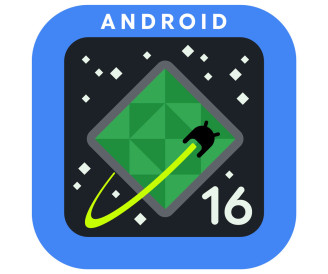
Android 16 Hits Critical Milestone Toward Release
The third public beta version of Android 16 is available now, and brings "platform stability", which means developers can begin finalizing and releasing apps that are specifically designed to be compatible with Android 16. The final version of Android 16 is expected as soon as May.

New Project Aims to Detect When Police are Using a Stingray
The Electronic Frontier Foundation (EFF) has released a new software tool that it hopes can alert people (such as protesters) when someone (such as police) may be operating an IMSI catcher (commonly known by the brand name Stingray) nearby. An IMSI catcher pretends to be a cell phone base station (tower) and records the unique identifiers of phones nearby that automatically attempt to connect to it. This new tool from the EFF — called Rayhunter — is designed to run on a specific Orbic Speed mobile hotspot device that can be found used online for as little as $10. The interface for using the software is web-based, and needs to be accessed from a different device, either via Wi-Fi or USB.
Apple Postpones Smarter Siri
Apple has confirmed that it is taking the company "longer than we thought to deliver" a new version of Siri with better awareness of your personal data and the ability to take action within apps. Apple first announced the features as part of Apple Intelligence in the middle of last year. Apple promised an on-device, private "semantic index" of your data (such as recent messages, calendar, contacts, etc.) that Siri could use to answer more questions, more intelligently. When Apple Intelligence finally launched as part of iOS 18.2, it did not include those improvements to Siri, but Apple said at the time that they would roll out "in the coming months". In today's update, Apple says only "we anticipate rolling them out in the coming year." Apple notes that it has launched other improvements to Siri, including "type to Siri and product knowledge, and added an integration with ChatGPT."
Utah Law Would Require App Stores to Verify All Users' Ages
Utah has just passed a law that would require app store operators like Apple and Google to verify users' ages and require parental approval for minors to download new apps. Other states are considering similar bills, but Utah's is the first to pass. Apple has opposed the measures, as it would not only add to its costs, but impact users' privacy. Other companies, like Meta, welcome the laws, as they could effectively shift the burden of confirming age categories from social networks to app store providers, and create a more consistent mechanism for verifying ages.
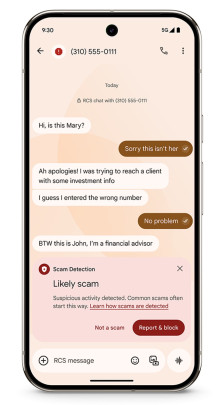
Advanced AI Scam Detection Comes to Google Messages
Google is enhancing its Messages app (the default Android app for RCS and SMS) with on-device AI to detect scam conversations and alert users. While the app already detects obvious spam and up-front scams, the new feature tracks ongoing conversations that may seem to have started as innocent conversations, but then turn to the scam phase. The feature is the result of Google partnering with financial institutions around the world to understand how the newest scams work.

Google Making it Easier to Find Apps with Widgets
Google is rolling out changes to its Play app store that will make it easier for users to find apps that include home-screen widgets. Users will now be able filter searches specifically for apps with widgets, and apps with widgets will get a special badge on their detail pages. Google's intention is promote both the development and use of widgets. If more users find and use apps with widgets, developers will have more incentive to create and update widgets. Google is also "actively educating users on the value of widgets through a new editorial page".
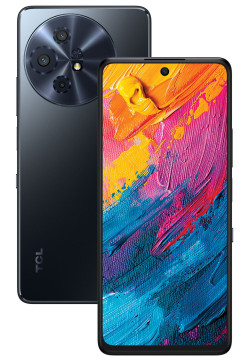
TCL Gives More Detail on 60 XE NXTPAPER 5G
First teased at CES, TCL's next NXTPAPER phone for the US now has more confirmed specs. We now know that it will be powered by a MediaTek Dimensity 6100+ chipset, and have expandable storage plus a 3.5mm headphone jack. The US version will come with more memory than the Canadian version: 8 GB RAM and 256 GB storage. It will have a 5,010 mAh battery and come with an 18W charger. Also on board are NFC, a fingerprint reader, Bluetooth 5.3, and Android 15. Back in January, TCL revealed that the phone would have a large 6.78" display with FHD+ resolution and 120 Hz refresh. As a NXTPAPER phone, the display has a unique matte finish and a special "e-paper" mode, which on this model can be activated with a dedicated switch on the side. We also knew that that the main camera would be 50 megapixel and the front camera 32 megapixel. Now we know that the other cameras are a 5 megapixel wide-angle cam and a depth camera for portrait mode. The 60 XE is slated to come to Canada this spring, and the US soon after.

Samsung Intros New Affordable Models
Samsung has announced three new models in its A series of affordable phones for 2025: the Galaxy A56 5G, A36, and A26. These cover the price points of $500, $400, and $300, respectively, rounding out the lineup with the $200 A16 5G that came out in January. Compared to last year's models, the displays are slightly larger, with all three having a 6.7-inch Super AMOLED display with 120 Hz refresh and FHD+ resolution. The processors have also been updated, with a Snapdragon 6 Gen 3 chip in the A36 replacing the Samsung Exynos 1380 in last year's A35. The A56 is powered by a Samsung Exynos 1580. The A56 and A36 get upgraded to faster 45W charging, while the A26 gets an IP67 rating for dust and water. The camera specs change only slightly, with all three having a 50 megapixel main camera as before. Also unchanged are all three having a 5,000 mAh battery and 128 GB of storage. The A26 and A36 have 6 GB of RAM while the A56 has 8 GB. The A56 also gains new AI powers, including Best Face and Nightography modes for the camera. Samsung also promises "up to six generations of Android OS and One UI upgrades and six years of security updates". The A26 comes in black, and the A36 comes in black or lavender. The A56 comes in two shades of gray as well as olive or pink. The A26 and A36 come out at the end of March, while the A56 is coming "later this year".
French Startup to Test mmWave 5G via Satellite
A company called Constellation Technologies & Operations is preparing to launch a test satellite for its own new 5G-from-space system. Constellation's will be the first such system to use high-frequency mmWave radio spectrum. This spectrum has the potential for very high-speed data transmission, but is under-utilized in most parts of the world. mmWave has relatively poor propagation characteristics, in that it typically doesn't reach very far, or penetrate solid objects well. Therefore, on land, it has typically been deployed only in the highest-density areas, such as arenas, stadiums, train stations, busy city plazas, and some city central business districts. This leaves mmWave spectrum completely unused in rural and remote areas where satellite connectivity is often most useful. Constellation has not announced plans for service directly to cell phones; the antennas necessary on the ground are much larger. But the system would potentially enable cell phone carriers to monetize their mmWave spectrum licenses that are currently unused or under-utilized. Constellation's first test satellite is currently scheduled to launch into Very Low Earth Orbit this June.
NYC Subway Using Pixel Phones and AI to Find Track Defects
The Metropolitan Transportation Authority (MTA) of New York City is working with Google Public Sector to use the sensors in off-the-shelf smartphones, combined with AI, to find defects in its train tracks faster, earlier, and more cost-effectively than existing methods. Google Public Sector developed this TrackInspect system using Pixel smartphones, with an attached microphone and built-in vibration sensors, mounted to operating subways cars. A custom AI system was trained to identify the sounds and/or vibrations associated with track issues that would require maintenance. Compared against traditional track inspections, TrackInspect found 92% of confirmed defect locations in its own. Google Public Sector developed the prototype system at no cost to the MTA, and the MTA is now proceeding to a larger pilot program to deploy TrackInspect.

Pixel Watch 3 Cleared to Automatically Call an Ambulance When Your Heart Stops
Google has received clearance from the U.S. Food and Drug Administration (FDA) to launch its "Loss of Pulse Detection" feature of the Pixel Watch 3 in the US. The Pixel Watch 3 already offers heart rate monitoring for health and fitness features. Now, it can use the same sensors to detect when your heart stops beating "from an event like primary cardiac arrest, respiratory or circulatory failure, overdose or poisoning". It can then "automatically prompt a call to emergency services for potentially life-saving care if you’re unresponsive." Having received this approval, Google will enable the feature via software update at the end of March. The feature is already available in 14 other countries. The feature requires US regulatory approval because it essentially makes the Pixel Watch 3 a medical device.
FCC to Explore Opening up More Mid-Band Spectrum
The FCC has announced proceedings to explore opening up more of the C Band to "more intensive use", possibly including lucrative mid-band 5G service. This large swath of spectrum spans 3.98 – 4.2 GHz, also known as the Upper C Band. The Lower C Band (3.45 – 3.55 GHz and 3.7 – 3.98 GHz) was auctioned off to mobile carriers starting in 2020, and is already a critical part of major 5G networks in the US. Phones and networks using band 77 use Lower C Band spectrum, and band 77 already covers this new Upper C Band as well. Mid-band radio frequencies such as these offer an excellent balance of high-speed data capacity and reach (coverage). The 4.0 – 4.2 GHz band is currently used in the US by satellite operators, including SES, Intelsat, and others, for space-to-earth (downlink) communication. Separately, the FCC is starting the process to re-auction some AWS-3 licenses that were returned to it when certain winning bidders (from Auction 97, in 2014) defaulted on their payment obligations. AWS-3 falls within band 66 and is already used for 5G by companies like AT&T, Boost, and Verizon. The frequencies of AWS-3 include 1695 – 1710 MHz, 1755 – 1780 MHz, and 2155 – 2180 MHz.
Verizon Intros New Discount with Mobile+Home Bundle
Verizon is offering a new bundle deal with a $15/month discount for customers who link their Verizon mobile and home internet accounts. The company is also offering "premium customer care, including personalized greetings and expedited support" to Mobile+Home bundle customers. Any Verizon postpaid mobile phone plan qualifies for this deal. Finally, for Mobile+Home customers with a "premium home internet plan" (any plan above the entry-level plan), Verizon is also offering a $10/month credit toward streaming services like Netflix & Max (both, with ads), the Disney triple bundle, or YouTube Premium.
FCC Intros Silent Emergency Alerts
The FCC has updated its rules for Wireless Emergency Alerts to allow for alerts that are silent. Authorized message originators will now be able to choose whether to suppress the loud sound and vibration that usually accompany such alerts. For accessibility, consumers will be able to override the vibration settings to always receive vibrating alerts if they wish. These new rules from the FCC are intended to address "alert fatigue" that leads people to switch off Wireless Emergency Alerts, reducing their effectiveness in public safety. "In addition, in some situations, such as during an active shooting, the loud 'attention signal' may put a consumer in greater danger."
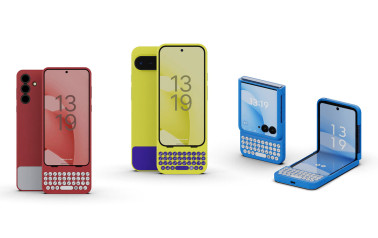
Clicks Keyboard Case Comes to Android
Clicks, the phone case that adds a physical QWERTY keyboard to the bottom of your phone, is expanding to offer models for several popular models of Android phones. (Clicks was previously only available for iPhones.) The new case models are for the Samsung Galaxy S25, Google Pixel 9 and 9 Pro, and the Motorola razr+. While all models expand screen real estate by moving the keyboard off the display, this benefit is perhaps most acute for the outer display of the Motorola razr+. Each is available in "Onyx" black or another bright color (Pinot red for Samsung, Surge yellow for Google, and Electric blue for Motorola). All three are available for $99 in special pre-order pricing until March 21st ($139 after that date). Expected shipping dates vary by model, ranging from April 30 for the Google version to "after June" for the Pinot color for Samsung.
AT&T, Verizon Successfully Test Video Calls Via Satellite
AT&T and Verizon have announced successful tests of AST SpaceMobile's growing fleet of commercial satellites that will offer broadband cellular coverage in current "dead zones". Both AT&T and Verizon successfully tested video calls using one of AST's new BlueBird satellites, the same satellites that will eventually power satellite coverage across the entire continental US, compatible with existing phones. AT&T previously completed a similar video call test in June 2023 via BlueWalker 3, a prototype AST satellite used strictly for testing; these new tests are the first using commercial AST satellites. The initial fleet of five BlueBird satellites was launched in September. AST was just given clearance by the FCC a few weeks ago to begin this testing. The five BlueBird satellites currently in orbit can only provide intermittent service. It will take some time for AST to launch the full 45–60 satellites necessary for 24/7 continuous coverage.
Amazon Ditching Appstore for Android
Amazon has announced that it is killing off its Appstore on Android as of August 20, 2025. After after that date, apps purchased from the Amazon Appstore on Android may no longer function. The Appstore could be side-loaded onto Android devices and offered an alternative to Google's Play app store. The Amazon Appstore was also the primary source of apps for Microsoft's Windows Subsystem for Android (WSA), which enabled Windows 11 devices to run Android apps. Microsoft is ending support for WSA on March 5, 2025.

AT&T Intros Bill-Splitting Option
AT&T has introduced SplitPay, a new, industry-first option to let post-paid customers who share a multi-line account split the bill. When using SplitPay, there is still a single "account owner" who is ultimately responsible for the whole amount. But the account owner can designate a different payor for each line. "Each month thereafter each of the designated lines is sent a text message with a secure link to pay their portion of the bill." SplitPay can also be used with AutoPay. Account owners will be notified — before the due date — if someone on the account hasn't paid their share. AT&T has patented the feature, but expects competitors to offer something similar soon.

The iPhone 16e Replaces Apple's iPhone SE
Apple has announced the iPhone 16e, the company's new "affordable" iPhone starting at $599, replacing the iPhone SE. (The iPhone SE was last updated in 2022 and started at $429.) The iPhone 16e is powered by the same A18 processor as the standard iPhone 16, supporting Apple Intelligence AI features. The iPhone 16e is also the first iPhone to use an Apple-designed cellular modem instead of a Qualcomm modem. This Apple C1 chip supports 5G and is "the most power-efficient modem ever on an iPhone". Apple claims the iPhone 16e's battery can last up to 12 hours longer than any iPhone SE. The iPhone 16e has a 6.1-inch OLED display with a notch for Face ID sensors and no home button, just like the iPhone 14. The display is protected by Ceramic Shield and the phone body is rated IP68 for water and dust resistance. The phone features Apple's satellite connectivity, including Messages, Emergency SOS, Roadside Assistance, and location sharing. The iPhone 16e has both wireless and USB-C charging. The single rear camera has 48 megapixel resolution, supporting 2x zoom, 4K video with Dolby Vision up to 60 fps, and Spatial Audio capture. The iPhone 16e will be available in black or white starting at $599 for 128 GB of storage. It will also be available with 256 GB storage for $699, or 512 GB for $899. Pre-orders start this Friday, with full availability beginning the following Friday, February 28.
Samsung Brings Digital Car Keys to Volvo / Polestar
Samsung is expanding its digital car key function to select Volvo and Polestar vehicles, starting with the Volvo EX90 and Polestar 3. The feature lets someone with a high-end Samsung Galaxy phone use their phone to unlock, lock, and start their car with only their phone, no physical key required. Samsung already offers this function for certain BMW, Mini, and Audi vehicles. The function also supports temporarily sharing a copy of the digital key with someone else. Digital car keys can be disabled remotely in the event your phone is misplaced or stolen. Many recent Apple and Google smartphones also support digital car keys.
TikTok Returns to App Stores
Apple and Google have both made TikTok available to download once again from their respective app stores. Almost a year ago, congress passed a law effectively banning the app over national security concerns, and President Biden signed it. TikTok challenged the law in court, but the effort failed, with the US Supreme Court upholding the law. In spite of this, President Trump's new US Attorney General Pam Bondi sent a letter to both Apple and Google assuring the companies that the ban would not be enforced, at least for now.
Apple Brings Apple TV+ to Android
Apple has launched an Android version of its Apple TV app, allowing people to watch the Apple TV+ and MLS Season Pass streaming services on their Android device. Apple TV+ includes Apple original TV shows like Severance, Slow Horses, Masters of the Air, and Ted Lasso, as well as original films like Wolfs and Killers of the Flower Moon. MLS Season Pass streams every Major League Soccer match, for all 30 clubs, with no blackouts. Apple TV is available now from the Google Play app store.
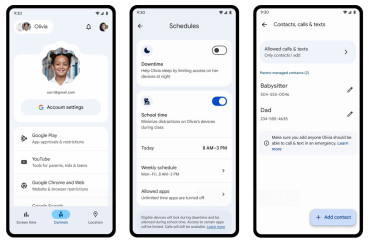
Google Makes Useful Parental Controls Part of Android
Google has announced a major update to its Family Link service that adds "School Time" and parent-managed contacts for Android phones. This brings Family Link much closer to a complete service for parents, that previously would have required a third-party Android device with specialized software, such as a Pinwheel or Bark phone. School Time lets parents set a schedule for extra restrictions during school hours to reduce distractions, with custom exceptions for apps that may be useful at school. Family Link also lets parents manage screen time, apps, web sites, and videos. It also includes location tracking. While Family Link can manage kids' "supervised" Google accounts, Google also announced a new AI-powered system that will attempt to guess the age of any Google account holder. This will enable Google to deliver an age-appropriate experience even for accounts that kids create on their own.

Snapdragon 6 Gen 4 Brings More AI to Mid-Range Phones
Qualcomm has introduced the Snapdragon 6 Gen 4, its newest chip to power mid-range smartphones. It offers across-the-board improvements compared to the 6 Gen 3, including 11% better CPU performance, 29% better GPU (graphics) performance, and 12% "power savings" for better battery life. (Even though it uses the same 4nm manufacturing process.) On the AI front, the Gen 4 brings new capabilities to the Snapdragon 6 series for the first time. This includes new on-device generative AI capabilities, AI-based background noise cancellation, and INT4 precision for faster / more efficient AI operations. Also new are Bluetooth 5.4 with LE Audio, triple-frequency location service (GPS), and support for 144 Hz display refresh. The 6 Gen 4 can also output 4K to an external display and includes new features for 4K gaming. The first phones using the Snapdragon 6 Gen 4 are expected to be announced "in the coming months".
T-Mobile Opens Up Satellite Service to Non-T-Mobile Customers
T-Mobile has opened up its new satellite coverage service to everyone in the US as the next phase of its beta testing program. The service is free for anyone who signs up (even Verizon and AT&T customers), until July. The company also announced pricing for the service when it fully launches this July. T-Mobile's satellite coverage is unique as the first to launch that works with existing phones. Starting in July, T-Mobile will include the service with its most premium plans. Other T-Mobile customers will be able to add it for $15/month. Customers of other carriers will be able to sign up for $20/month. T-Mobile has partnered with SpaceX on the service, which is a recent upgrade to its Starlink network. AT&T and Verizon are beginning to test a similar service that works with existing phones, in partnership with AST SpaceMobile, but full launch could be up two years away.
UK Demands Unfettered Access to Apple iCloud Data for Everyone, Everywhere
The United Kingdom has secretly ordered Apple to lets its security officials access user data stored in the cloud, even for users located in the US and other countries outside of the UK. Apple will be hard-pressed to comply, as its Advanced Data Protection option offers end-to-end encryption (E2EE) for iCloud data, meaning even Apple does not have access to the data, by design. The order requires blanket access, not just for specific users under investigation. Apple may stop offering Advanced Data Protection in the UK, but this would not bring Apple into compliance with the order for overseas users. The only path to full compliance would be to stop offering E2EE and create a "back door" for the government. But the existence of any back door also opens the door for foreign spies and criminals to access user data via the same method. The order was issued under the U.K. Investigatory Powers Act of 2016, also known as the "Snoopers' Charter". The law makes it makes it a criminal offense for Apple to reveal that the government has even made such a demand. Therefore Google may have already received a similar demand, which would be difficult to confirm. Both companies have been rolling out E2EE for messaging and other services in recent years.

Apple Launches Event Invitation Service
Apple has launched a new service called Apple Invites for iCloud+ subscribers. Apple Invites is available as both a new iOS app and on the web at icloud.com/invites. iCloud+ subscribers can create events and invite people to RSVP. Anyone can RSVP, regardless of whether they subscribe to iCloud+ or have an Apple device. Invitations can include a custom image and text, both of which Apple Intelligence can help create and/or tweak using generative AI (on compatible devices). Invitations can also include a soundtrack from Apple Music, and include a shared album, to which attendees can contribute photos & videos. Invitations can also link to directions to an address, and include a weather forecast.
AST SpaceMobile Cleared to Test Satellite Coverage with AT&T, Verizon
The FCC has given its blessing for AST SpaceMobile to begin testing its commercial satellites that provide cellular coverage to existing, off-the-shelf cell phones anywhere in the US. AST has deals in place with both AT&T and Verizon to provide this service, and will soon commence testing with both providers. AST currently has five of its BlueBird satellites in orbit, with deals in place to expand the constellation to 60 satellites over the next two years. At least 45 satellites are required for continuous service, so the current testing starting with just five satellites will "support non-continuous cellular broadband service". T-Mobile is working with SpaceX on a similar service. The FCC granted those companies authorization for service in November. While T-Mobile is using software updates to limit the service to specific phone models as it tests, AST promises its service will work with "unmodified smartphones ... without the need of any specialized software or device support or updates."
More articles in the Archive ›
What do you want to hear about? We're already working on a number of articles for the coming months, but we want to write about the things you're most interested in. So sound off: tell us what you want to know more about!



